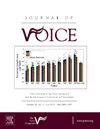唱歌跑调的关键:训练有素的歌手与音高失真。
IF 2.5
4区 医学
Q1 AUDIOLOGY & SPEECH-LANGUAGE PATHOLOGY
引用次数: 0
摘要
目的:音高感知失真(PPD)是一个新术语,用于描述这样一种现象,即扩音伴奏歌手对自己相对于乐队或伴奏的演唱音高的感知变得模糊不清,从而导致以下两种情况之一:a)歌手认为自己与伴奏不在一个调上,但听众认为自己在一个调上;或 b)歌手认为自己与伴奏在一个调上,但实际上不在一个调上。本试验研究旨在调查扩音伴奏表演者是否存在PPD以及PPD的发生率,并确定相关变量。设计/方法:招募了115名歌手参与在线调查,调查收集了有关音乐训练、表演环境和PPD经历的信息:结果:报告的 PPD 发生率为 68%,92% 的受访者表示 PPD 很少发生。据报告,与 PPD 经历最相关的因素包括舞台音量过大、歌曲不熟、唱歌时音调超出自己的习惯音域以及唱歌声音过大。与以往的研究和我们的假设相反,我们没有发现听觉反馈方式(如入耳式与落地式监听器)与 PPD 发生率之间存在关联。此外,我们还发现训练水平越高,PPD 的发生率也越高:报告的发生率证明,PPD 的存在超出了偶然性和传闻经验。从训练有素的样本来看,数据表明,伴奏、扩音表演中的音准准确性可能更多地与听觉环境(特别是舞台音量)以及训练有素的歌手针对该环境的调音策略有关,而不是与歌手对声调技巧的掌握有关。舞台音量过大被认为是与 PPD 相关的主要因素,这可能与镫骨反射有关。未来的研究将在建立听觉反射基线阈值和客观测量音调准确性之后,尝试在训练有素的歌手中激发 PPD。本文章由计算机程序翻译,如有差异,请以英文原文为准。
The Key to Singing Off-Key: The Trained Singer and Pitch Perception Distortion
Objectives
Pitch perception distortion (PPD) is a novel term describing a phenomenon in which an amplified, accompanied singer's perception of their sung pitch relative to band or accompaniment becomes ambiguous, leading to one of two conditions: a) the singer believes they are out of tune with the accompaniment, but are in tune as perceived by a listener, or b) the singer believes they are in tune with the accompaniment, but are not. This pilot study aims to investigate the existence and incidence of PPD among amplified, accompanied performers and identify associated variables.
Design/Methods
115 singers were recruited to participate in an online survey, which collected information on musical training, performance environment, and PPD experience.
Results
Reported PPD incidence was 68%, with 92% of respondents indicating that PPD occurred rarely. The factors reported as most associated with PPD experiences included loud stage volume, poor song familiarity, singing outside one's habitual pitch range, and singing loudly. Contrary to previous studies and our hypotheses, no association was found between modality of auditory feedback (e.g., in-ears versus floor monitors) and incidence of PPD. Additionally, higher levels of training were found to be associated with higher incidence of PPD.
Conclusions
The reported incidence supports that PPD exists beyond chance and anecdotal experience. In light of the highly trained sample, the data suggest that pitch accuracy in accompanied, amplified performance may be more associated with aural environment–specifically loud stage volume–and a highly trained singer's tuning strategy in response to that environment rather than a singer's mastery of vocal intonation skills in isolation. Loud stage volume was implicated as a primary factor associated with PPD, which may be related to the stapedius reflex. Future investigations will target attempted elicitation of PPD in trained singers after establishing baseline auditory reflex thresholds and objective measurements of intonation accuracy.
求助全文
通过发布文献求助,成功后即可免费获取论文全文。
去求助
来源期刊

Journal of Voice
医学-耳鼻喉科学
CiteScore
4.00
自引率
13.60%
发文量
395
审稿时长
59 days
期刊介绍:
The Journal of Voice is widely regarded as the world''s premiere journal for voice medicine and research. This peer-reviewed publication is listed in Index Medicus and is indexed by the Institute for Scientific Information. The journal contains articles written by experts throughout the world on all topics in voice sciences, voice medicine and surgery, and speech-language pathologists'' management of voice-related problems. The journal includes clinical articles, clinical research, and laboratory research. Members of the Foundation receive the journal as a benefit of membership.
 求助内容:
求助内容: 应助结果提醒方式:
应助结果提醒方式:


